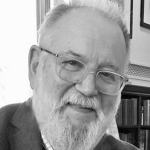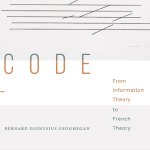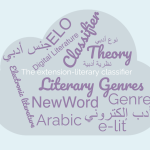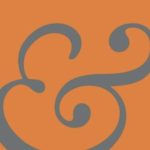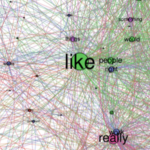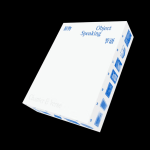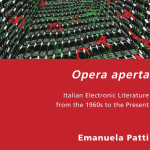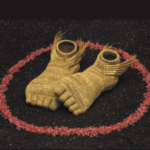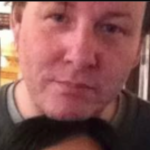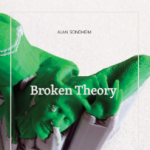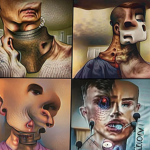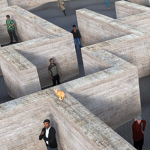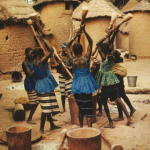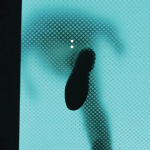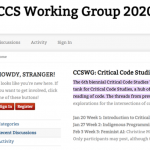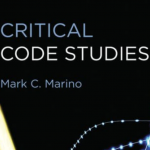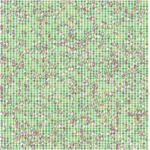2023
The editors at ebr asked Bobby Arellano to draft a reflection on the passing of George Landow. Working with Landow in the early years of the Victorian Web, Arellano transferred most of the documents from the Intermedia system into Storyspace and relinked them. We present Arellano's reflection, in memoriam, along with an official obit provided by Ruth Landow (George's friend of 78 years and his wife of 57 years).
Is it possible to discover digital prophecies in thinkers like Lacan, Barthes, Derrida, Foucault, Deleuze, and Baudrillard? Heckman has a go at it in this close reading of Dionysius Geoghegan's Code: From Information Theory to French Theory.
On this episode of Off Center, Scott Rettberg is joined by artist and poet Jason Nelson to discuss the background behind Jason's weird and intriguing work, creativity in the digital age and the intersection between art and research. Behind every artist there is a story, and Jason's include disappearing masonic rings, Brazilian televangelists and city planning.
CDN Director Scott Rettberg and the Center's Principle Investigator Joseph Tabbi discuss the decades-long development of a born-digital, community based publication. The Electronic Book Review brings together literary scholars and conceptual artists from a widening set of disciplines and geographical regions. While foregrounding critical discourse, the journal will bring to our readership the sorts of activities that we'll be featuring in our e-lit node: activities which we designate as a Publishing And Infrastructure Group (PAIG). As our readers pick up on things that our authors have written, they too become an active part of our discursive community. Debates and dialogues are thus the order of the day, as authors and audiences begin to merge.
Reham Hosny (University of Cambridge and Minia University) asserts that works of e-lit resist straightforward classification due to their "hybrid and mosaic nature." This complexity poses formidable hurdles in the development of computational models aimed at categorizing e-lit into distinct genres. The challenge is further compounded by issues such as media format obsolescence, ephemerality, interactivity, and the wide array of manifestations across different platforms. Despite these formidable challenges, Hosny not only explores potential solutions but also provides a comprehensive framework for understanding the core issues associated with the classification of e-lit.
Martin reviews Astrid Ensslin's Pre-Web Digital Publishing and the Lore of Electronic Literature, a book that addresses the knowledge gaps surrounding the early era of digital creation and publishing, while testifying to the necessity for multidisciplinary approaches to this field of study. Martin discusses the reconstructivist stance from which Ensslin labors to embed digital literature into our larger understanding of the literary arts.
Scott and Jill Retberg, directors of the Center for Digital Narrative (CDN) at the University of Bergen, discuss their motivations and goals for the new research center. Digital narrative encompasses various fields such as electronic literature, game studies, AI, VR, social media narratives, and computational narrative systems. The podcast aims to explore the frontiers of digital narrative by engaging with researchers, artists, and authors in these fields. CDN aims both to produce new research and creation in digital narrative and to present ideas in a more accessible way, such as through exhibitions and popular forms of publication to reach a broader audience. The Off Center podcast is a released on a biweekly basis, and we will be releasing selected transcripts each month on ebr.
On this first Sunday in July 2023, as the Electronic Literature Organization prepares for its meeting in Coimbra, Portugal, we present a set of reflections by four ELO members who co-organized this Organization's 2021 conference fully virtual conference, titled "Platform (Post?) Pandemic." What we have is an insightful critique of platform conferencing. The concepts of datarama turned dadarama offer a refreshingly literary way of reorienting the discourse of the ELO's annual conference.
This article examines how the formation of data can be seen as an aesthetic way of making sense. Following work in digital aesthetics, the article proposes to understand digital artifacts and processes via formalization and operation of media language. Li traces this idea through several examples from recent literature, film, games, and artwork in South-East Asia. Together with these examples, Deleuze’s philosophical thoughts on a genesis of sense production are re-considered in order to understand a formal way of making sense in producing the new. The notion of “abstraction” from ancient Chinese mathematical thought offers a re-consideration of Deleuze’s “intensive virtual”, that is, the way the formal, the operative and abstraction determine the extensive intensive. Sense-Data and atmospheric language address computation’s materiality in engendering the formal and the operative modalities of media language, as a way of producing states of being and becoming in cultural activities in which the digital is an agency.
Starting with Umberto Eco's 1962 essay, "Opera aperta," and progressing into Emanuela Patti's tentative forays into Italian Electronic Literature from the 1960s to the Present, Roberta Iadevaia nicely locates a trajectory for Italian e-Lit, albeit one that is still open, "in contention," without any "encyclopedic guarantee, and no single world order on which our imaginative projections can rest."
In this substantial and original analysis (which is more a review essay than a simple review) Joy Wallace further extends a series of five reflective pieces on the renowned Australian poet, performer, and multimedia writer, Hazel Smith.
2022
In this in memoriam, Patrick Lichty remembers community member and artist, the late Jeremy Hight. We at EBR remember Jeremy fondly. His creative works will continue to be respected for the contributions they make to e-literature.
In his review of Broken Theory by new media artist and theorist Alan Sondheim, Aden Evens traces Sondheim's eclectic and stylistic meditations on the limits of philosophy, language, and code, expressed through the author's experimental art and research projects. Sondheim's fragmentary monograph and Evens' review by extension explore the inevitability of failure as an 'ontological guarantee' and suggest writing as a necessary—albeit inadequate and unfulfilling—response.
Melinda M. White's itinerary through the iDMA 2022 Weird Media Exhibition in Winona consider the various forms of weirdness or strangeness evoked by the exhibited works. She explores how strangeness characterises human relationship to constantly transforming technologies, how it manifests itself in our difficult pasts, and how it points to alternative of unexpected futures. While the weird encounters with the exhibition works in no way point to a single, unifying thread or approach to the theme, White's account reveals shared concerns, tendencies, and connections among them. Temporal distance and experiences of loss render familiar technologies, objects, or places unfamiliar; the borders between human and non-human entities and perspectives is blurred or even discarded; humor and surreal irreverence are employed to raise urgent questions on ecology, ethics, and individual or collective narratives and subjectivities.
Mariusz Pisarski takes us on a detailed tour through the cognitive intricacies of hypertext classic Victory Garden's migration from Storyspace (circa 1992) to the Web. In so doing, Pisarski observes how years of Stuart Moulthrop’s experience as a mentor and teacher of digital literature, and as a practicing hypertext scholar and writer, are built into the anniversary edition of Victory Garden.
In a series of interviews led in February and March 2021, Nacher, Pold and Rettberg examined how contemporary digital art and electronic literature responded to the pandemic. Their project on COVID and electronic literature was funded by DARIAH-EU and resulted in the exhibition prepared for the ELO 2021 Conference & Festival and the documentary film that premiered in June 2021 at the Oslo Poesiefilm Festival. xtine burrough is one of the creators of 13 works that were interviewed for the project. She generously shares her thoughts on life and creativity, collapsing spaces and the meaning of a domestic art practice during the pandemic.
Where Tomasula (in his own words) makes “no attempt to historicize the field,” preferring to offer “a snapshot” of a vibrant body of conceptual literary art, Gonzalez in this review arrogates the position Tomasula passes on, and proposes that the many texts in Tomasula's "immensely rewarding" anthology continue in the spirit of postmodern literary forms and show the continuing potency of the postmodern toolbox.
Jeremy Douglass and Mark C. Marino reflect on the activities of the Critical Code Studies (CCS) Working Group 2020.
Mark C. Marino and Jeremy Douglass discuss the field of Critical Code Studies (CCS) and introduce three reports about the discussions of the CCS Working Group 2020.
Meredith Finkelstein surveys key methodological aims of CCS, and considers the ways attending to code can enrich understanding of digital works, looking specifically at digital artist and programmer Eugenio Tisselli’s code for Amazon.html
